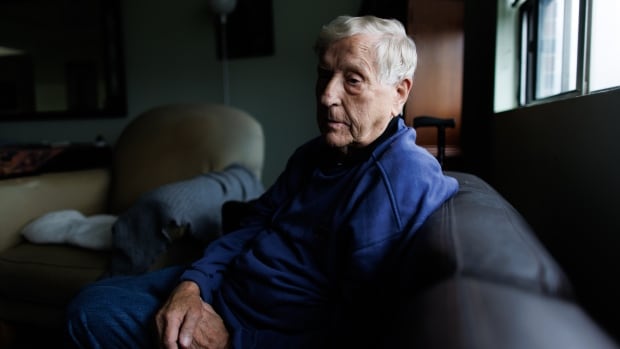The man, who claims he suffers from a chronic and worsening mental illness, is among those filing a lawsuit challenging euthanasia laws that exclude people who suffer solely from mental illness.
The petition, filed Monday in Ontario Superior Court by the advocacy group Dying with Dignity, argues that the federal government is discriminatory by making euthanasia available to people who are physically suffering but not those with mental illnesses.
The group is asking the court to immediately quash the exclusion on mental health grounds.
Plaintiff John Scully said going to court was his last hope.
The former war correspondent said no medication, therapy or treatment has eased the post-traumatic stress disorder (PTSD), depression and anxiety he suffers from, adding that lack of sleep makes his symptoms worse.
“In the last 36 hours, I [of] “Sleep is tainted with unpleasant, cruel nightmares,” he said in a recent interview.
Scully, 83, said his condition, both mentally and physically, was worsening by the day.
“I feel like I have an obligation to do everything I can to say, not ‘look at me,’ but ‘look at us,'” he said. “Please, do something.”
In February, the Liberal government announced it would postpone plans to expand euthanasia to include people with mental illnesses from March. The expansion has been delayed until 2027.
The government noted concerns in some states about preparedness and unresolved questions from psychiatrists about how clinicians can determine whether mental illnesses are treatable.
Mental health exclusion violates the Charter: Plaintiffs
In the “Death with Dignity” lawsuit, Scully and a third plaintiff, Claire-Elise Brosseau, argue that the mental illness exclusion violates section 7 of the Canadian Charter of Rights and Freedoms, which says people have a right to life, liberty and security.
“It is constitutionally unjust to prolong the permanent and intolerable suffering of Canadians who are excluded from MAID benefits because of their mental illness,” the plaintiffs’ filing read.
The lawsuit alleges that people suffering from severe and incurable mental illnesses are being denied safety and freedom and forced to endure prolonged suffering.
Death with Dignity argues that exclusion based on mental illness also violates the right to equality under the law.
The Liberal government passed euthanasia legislation in 2016 and amended it in 2019 after a lower Quebec court ruled that requiring death to be reasonably foreseeable in order to qualify for euthanasia was unconstitutional.
In 2021, the government passed a new amendment to the law, including a Senate amendment to remove the exclusion for people who suffer only from mental disorders. Senators who supported the amendment argued that the exclusion was discriminatory.
Initially, people with intolerable mental illnesses were meant to be able to access euthanasia reviews from March 2023. Just months before the changes were due to come into effect, the government announced it would legislate a one-year delay to give clinicians more time to train.
As the March 2024 deadline approached, a joint congressional committee of senators and representatives held hearings on the planned expansion that revealed deep divisions across legal and medical disciplines over the issue. The committee recommended a further delay.
The government ultimately legislated a three-year delay, but Health Minister Mark Holland and Justice Minister Arif Villani said it was necessary to address provinces’ concerns and allow additional time for training.
Supporters of the expansion argued against the delay, saying training materials have been developed and clinicians who already evaluate patients for euthanasia say they are prepared.
At the time, Holland reiterated the government’s position that mental anguish is equivalent to physical anguish, and said he expected states to be prepared.
Conservative leader Pierre Poirievre has promised to completely reverse the expansion plans if his party comes to power in the next election.
Helen Long, CEO of the Canadian Society for Dying with Dignity, said it’s unfortunate they have to turn to the courts to force the government to make its own laws.
She attributes the delay to a lack of “political will.”
The offices of Holland and Villani did not immediately respond to requests for comment.
Scully says she lives in fear.
Long said her organization has heard from people and families about the hardships caused by repeated delays.
“The fact that they’ve been made to wait and then given an appointment and then given another appointment makes it very difficult for them to continue to hang in there and wait for the evaluation,” she said.
“They should be given the ability to apply.”
Scully said she lives in constant fear that lack of sleep will worsen her mental and other illnesses and lead her to take her own life, which she has already attempted twice before.
“Every day I get a little closer,” Scully said. “I don’t want to commit suicide because I know the fear and grief it brings to survivors. It’s just so horrible for the people left behind.”
Long expects the court process to be lengthy, but said speeding it up would pave the way for people like Scully to be recognized once the case begins.
Mr Scully was interviewed by two clinicians who assess patients for euthanasia and said that if the rule was expanded, he would be eligible.
“It’s sobering. Really. It’s breathtaking.”

